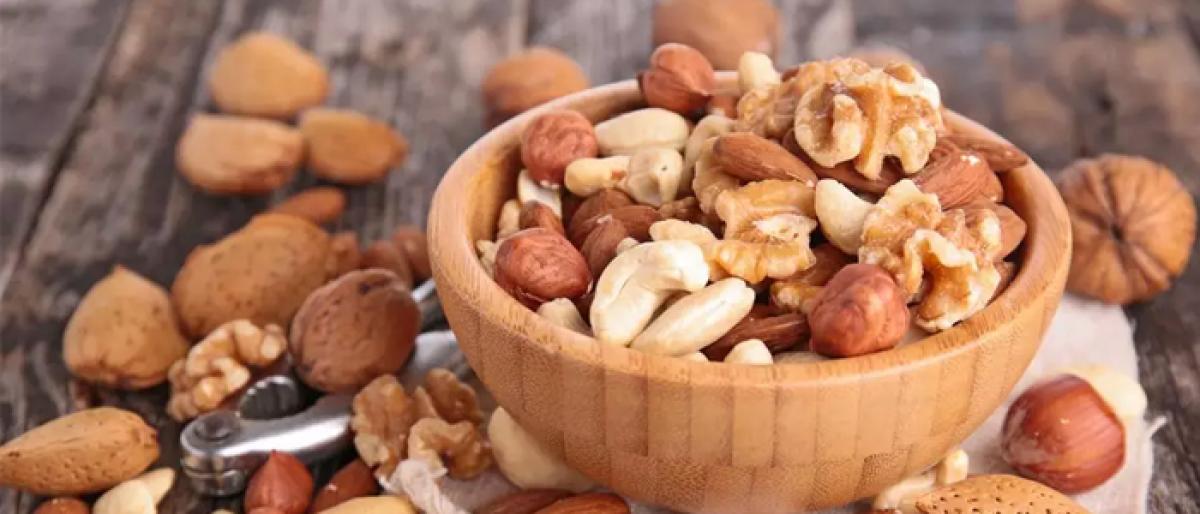Experts reveal health benefits of eating nuts

Turns out, eating Brazil nuts and other varieties of nuts daily may prevent weight gain and provide other cardiovascular benefits
Washington: Turns out, eating Brazil nuts and other varieties of nuts daily may prevent weight gain and provide other cardiovascular benefits.
Two separate studies presented at the American Heart Association’s Scientific Sessions 2018 in Chicago tried to show the benefits of eating nuts daily.
One study analyzed the influence of eating nuts and peanuts on long-term body weight in U.S. men and women. The other study examined whether eating Brazil nuts could increase a sense of fullness and improve glucose and insulin responses.
In the analysis of nuts’ impact on weight, researchers followed health professionals who were free of chronic disease at the start of the study. They found that eating one one-ounce serving of any type of nuts or peanuts, in place of foods generally considered low in nutritional value, was associated with a lower risk of long-term weight gain and obesity.
Nut consumption was assessed through a food-frequency questionnaire submitted to participants every four years in three different established study groups of 25,394 men in the Health Professionals Follow-up Study, 53,541 women in the Nurse’s Health Study and 47,255 women in the Nurse’s Health Study II in follow-up research.
The findings revealed that eating a daily serving of any type of nut or peanuts was associated with less risk of weight gain or becoming obese over the four-year intervals. It also showed that substituting one serving a day of any type of nuts in place of one serving of red meat, processed meat, french fries, desserts or potato chips was associated with less weight gain over the four-year intervals.
A serving of nuts is defined as one ounce of whole nuts or two tablespoons of nut butter. “People often see nuts as food items high in fat and calories, so they hesitate to consider them as healthy snacks, but they are in fact associated with less weight gain and wellness,” said first author of the study, Xiaoran Liu.
“Once people reach adulthood, they start to gradually gain about one pound a year of weight, which seems small. But if you consider gaining one pound over 20 years, it accumulates to a lot of weight gain. Adding one ounce of nuts to your diet in place of less healthy foods — such as red or processed meat, French fries or sugary snacks — may help prevent that slow, gradual weight gain after you enter adulthood and reduce the risk of obesity-related cardiovascular diseases.” she said.
In the Brazil nut study, conducted at San Diego State University in 2017 through a grant from the American Heart Association, 22 healthy adults (20 women and two men) age 20 or older with a mean body mass index of 22.3, consumed either 36 grams of pretzels or 20 grams of Brazil nuts (about five nuts) in addition to their usual diet. The Brazil nuts and pretzels had approximately the same amount of calories and sodium. Participants ate either the nuts or the pretzels in two trials with a washout period of at least 48 hours to prevent carryover effects.
The study found, both Brazil nuts and pretzels significantly increased a sense of fullness and reduced feelings of hunger, with the greatest sense of fullness experienced by the group eating Brazil nuts compared to those eating pretzels. It also found that pretzel consumption caused a significant increase in blood glucose and insulin at 40-minutes after they were eaten, compared to the start of the trial, whereas eating Brazil nuts did not significantly increase blood glucose or insulin.
“While both Brazil nuts and pretzels increased a sense of fullness after they were eaten, eating Brazil nuts stabilized postprandial (after eating) blood glucose and insulin levels, which may be beneficial in preventing diabetes and weight gain,” said senior study author Mee Young Hong.
Brazil nuts are one of the highest known food sources of selenium, a mineral which the researchers note in previous studies may be associated with improvements in insulin and glucose responses.
“Our study allows researchers and clinicians to consider the possible beneficial role of Brazil nuts to help people feel full and maintain a healthy level of glucose, reducing the risk of obesity and diabetes,” Hong said.














